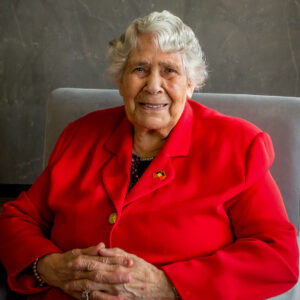Lowitja Institute Statement
Dr Lowitja O’Donoghue AC CBE DSG
1 August 1932 – 4 February 2024

It is with deep sadness that Lowitja Institute acknowledges the passing of our patron and namesake, Dr Lowitja O’Donoghue AC CBE DSG, who died peacefully, with her family by her side on 4 February 2024.
It is a sadness we know will be shared by people across Australia and around the world as she touched the hearts of many with her strength and courage throughout her life.
A true trailblazer, leader and advocate for the rights of Aboriginal and Torres Strait Islander peoples and Indigenous peoples globally, Dr O’Donoghue lived a remarkable life and made an enormous contribution to public life and the pursuit of justice and equity.
Her commitment to championing Aboriginal and Torres Strait Islander leadership and health research in will always be remembered, and her legacy continues through her family, the Lowitja Institute and Lowitja O’Donoghue Foundation.
A proud Yankunytjatjara woman, Dr Lowitja O’Donoghue was born in 1932 in the remote north-west corner of South Australia and was removed from her mother at just two years old. Lowitja and her siblings grew up at Colebrook Children’s Home at Quorn, South Australia. They weren’t allowed to speak their own language or to ask questions about their origins or even about their parents. The missionaries gave Lowitja the name, Lois. Lowitja did not see her mother again for more than 30 years, until reunited with her in 1967 at Oodnadatta.
Dr Lowitja O’Donoghue’s dedication to health and wellbeing began at a young age when she moved from domestic work to becoming the first Aboriginal trainee nurse at the Royal Adelaide Hospital in 1954. Dr O’Donoghue fought discrimination throughout her training yet despite the challenges, graduated to soon become Charge sister at the hospital where she worked for approximately ten years.
Travelling abroad and nursing in India as part of a Baptist mission also gave Dr O’Donoghue a broader perspective of the poor human rights experienced by Indigenous peoples and so ignited the flame to fight for justice. In the 1967 Referendum, she campaigned for the recognition of Aboriginal and Torres Strait Islander peoples and soon after joined the Department of Aboriginal Affairs.
Dr O’Donoghue’s career spanned over two decades with many senior appointments in Aboriginal affairs in the public sector. Most notably, in 1990 Dr O’Donoghue was appointed the founding chairperson of the Aboriginal and Torres Strait Islander Commission (ATSIC) where she played a key role in drafting the Native Title legislation that arose from the High Court’s historic Mabo decision.
As the inaugural chair of the Cooperative Research Centre for Aboriginal and Tropical Health (1996–2003), later to become the Lowitja Institute in 2010, Dr O’Donoghue worked tirelessly to reform Aboriginal and Torres Strait Islander health research through ensuring Aboriginal and Torres Strait Islander communities and researchers were in the driving seat to influence better health outcomes.
Dr O’Donoghue inspired outstanding Aboriginal and Torres Strait Islander leadership, working alongside co-patron and former Lowitja Institute chair Pat Anderson AO whom she described as ‘fearless and energetic.’
With an open heart, she spoke of the need for recognition and a voice for our peoples – advocating to work closely with governments ‘to get the job done’ and appealed to non-Indigenous friends and colleagues to work alongside us.
An inspiration to many, she received numerous awards and accolades for her work, including the Commander of the Order of the British Empire (CBE) in 1983 and Australian of the Year in 1984, and became the first Aboriginal person to address the United Nations General Assembly. Dr O’Donoghue also holds two Honorary Fellows, nine Honorary Doctorates and a Professorial Fellow from various universities.
When Dr O’Donoghue entrusted her name to the Lowitja Institute, she told us to be a courageous organisation, committed to social justice and equity for Aboriginal and Torres Strait Islander people, to match words to action, and be known for working fearlessly for change and improvement in the lives of Aboriginal and Torres Strait Islander people.
We judge all our work through that lens.
Dr O’Donoghue was our first chair, and our patron. Her values and vision live on in Lowitja Institute. We are humbled and honoured to have had her leadership and guidance throughout our history, and it is due to her strength, rigour and support that Lowitja Institute has become a national leader in Aboriginal and Torres Strait Islander health and research.
Noel Pearson once described her as ‘the greatest Aboriginal leader of the modern era … the rock who steadied us in the storm.’
We are committed to continuing her legacy for the health and wellbeing of our peoples.
Your job is to work ceaselessly, with confidence in who we are, with our knowledge timeless and modern, our endless strength and resilience, our capacity for hard work, our wise heads, our wonderful talented young.
– Dr Lowitja O’Donoghue AC CBE DSG, The future is in your hands, 2016
Download the Lowitja Institute Statement
Read the O’Donoghue Family Statement
Read media release
The Lowitja O’Donoghue Foundation was established in 2022 to mark Dr O’Donoghue’s 90th birthday. In lieu of flowers, we ask people and organisations to please consider a donation to the Foundation in memory of Dr O’Donoghue.
Protocols and permissions granted for public use by Deb Edwards
Please formally address Lowitja O’Donoghue as Dr Lowitja O’Donoghue AC CBE DSG.
Please do not use the name Lois O’Donoghue in any manner of reference.
Please only use the images provided in the media release and use appropriate credits. For detailed photo descriptions, please reach out to communications@lowitja.org.au

